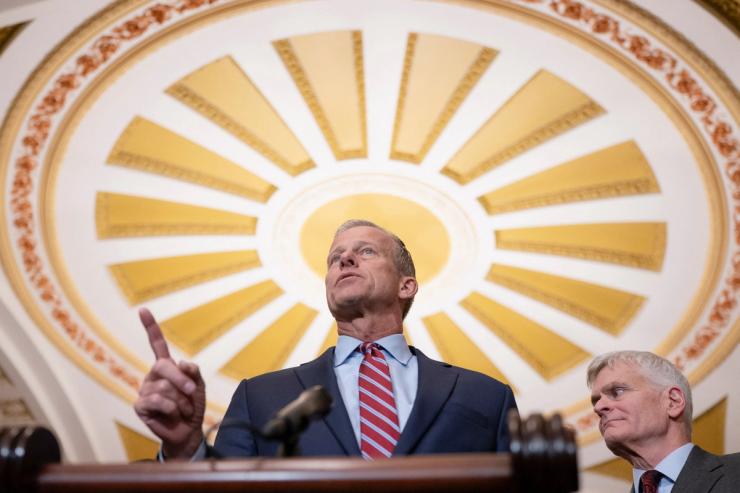The News
This is not exactly what John Thune had in mind when he became Senate majority leader: Trying to hold his Republicans together on President Donald Trump’s tax and border agenda as a tariff storm deluges the US economy.
Thune took power in January with his own plan to get things done for Trump. He favored a two-bill approach designed to unite the GOP around border security and then figure out tax cuts later, a path that lost out to a complicated megabill.
As an ag-state Republican, Thune also has own views on tariffs — he’s not a huge fan of them. But he largely suppressed criticism this week of Trump’s tariffs, giving the president space to negotiate and projecting hopes that the resulting economic pain is only temporary.
“I can’t imagine how hard his job is,” said Sen. Lisa Murkowski, R-Alaska, who met with Thune on Thursday. “One of the things about Leader Thune is, he will sit down and listen to his folks … so it’s not as if I feel I’m not being heard.”
Murkowski felt heard enough to vote with her party to advance the Republican budget — no small feat, given the Alaskan’s opposition to its prospective Medicaid cuts and her questions about how the House and Senate will reconcile their opposing views. And during the most tumultuous week since Trump became president, Thune’s budget breakthrough didn’t make as many headlines as it otherwise might have.
The lowlight of his week was probably losing four GOP senators to a rebuke of Trump’s Canada tariffs, though that number belied how broadly worried Republicans are about global trade. The genial Thune acknowledged to Semafor that it was a “tough week” to navigate.
“We had some work to do. And we eventually got there,” Thune said of a budget vote that ended up only losing Sen. Rand Paul, R-Ky. He added that the tariffs are “separate” from the rest of the agenda, “but obviously that’s an issue that’s on everybody’s mind.”
Thune’s election to succeed Mitch McConnell last year was a predictable ascension of the No. 2. Yet the stylistic changes are clear; Thune is more conciliatory than the famously ruthless McConnell.
Even as the rank-and-file grew impatient, the new majority leader spent weeks listening to his GOP colleagues before finally taking the next step in Trump’s agenda. It proved effective in corralling recalcitrant moderates and conservatives alike.
Sen. Susan Collins, R-Maine, told Semafor she talked to Thune several times about the House GOP’s proposal, which could result in significant Medicaid cuts.
“It’s been a very difficult week, obviously, with very contentious issues. But Sen. Thune understands that we come from different states with different perspectives and he respects that,” she said.
In this article:
Know More
One of the biggest unanswered questions at the start of this year was how Thune might work with Trump. The South Dakotan is starting to answer those questions.
He helped set up a Wednesday meeting with the president and the Senate Budget Committee’s Republicans — a group stacked with hardliners — whom Trump reassured about budget cuts. Trump then spoke directly to Sen. Josh Hawley on Thursday about Medicaid, telling the Missourian he wouldn’t support Medicaid cuts.
Hawley has another key priority that he’ll need Thune’s help to move through the Senate: Reauthorizing the law that provides benefits to people who suffered from exposure to atomic weapons testing. Hawley says he won’t raise the debt ceiling without a commitment to extend that law, a standoff that could come to a head in a few months.
“We’ve had some good substantive conversations on this,” Hawley told Semafor of Thune.
Most Republicans give Thune positive reviews. Still, some Republicans have quietly complained about an unpredictable and rigorous Senate schedule and a schism with the House that’s leading the upper chamber into its second “vote-a-rama” in two months’ time. And the agnostic president largely deferred to GOP leaders.
“You have the dynamic of razor-thin margins, bicameral friction. You’ve got consultation with the White House. Multi-variable equations, based on my experience, are difficult,” said Sen. Thom Tillis, R-N.C. “Just when [Thune] thinks he’s figuring out the last variable, another one pops up.”
He thanked Thune on Friday, he said, for keeping his “composure” this week.
Burgess’s view
I’ve known Thune for more than 10 years, and he’s shown real staying power in a party that keeps shifting. More than a decade after he toppled then-Senate Democratic leader Tom Daschle, Republicans urged him to look at running for president, but Thune understood the moment — he thought of himself as too close to Washington to win a GOP primary.
He kept his eyes on a different prize: Succeeding McConnell. It’s a tougher job with Trump in his second term, but Thune successfully confirmed the president’s Cabinet and is about to get the budget hot potato out of the Senate and back to the House.
Tariffs promise to be his biggest leadership test yet. A bipartisan bill requiring congressional approval of Trump’s levies is gaining momentum within the GOP. Thune himself is largely refraining from criticizing Trump’s tariffs so far, though he’s quick to remind reporters he has his “own views” and hails from an export-driven state.
And tariffs aren’t the only huge task on his plate, with the debt ceiling, a final tax bill, and the midterms are all waiting in the wings.
Still, it’s remarkable that the HoneyThune, as we called it a few months ago, isn’t quite over yet.
Room for Disagreement
The loudest grumbling on the GOP side of the aisle under Thune may be about transparency regarding party leaders’ strategy.
“I’ve had numerous conversations with senators who are livid about getting asked questions by reporters when the reporter clearly knows more about it,” Hawley said. “That probably could be improved.”
Notable
- The New Yorker dug deep into Thune’s bid to keep the Senate relevant.


